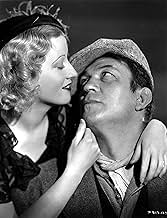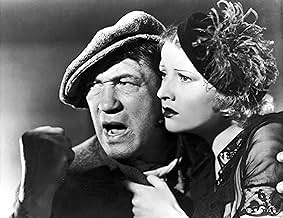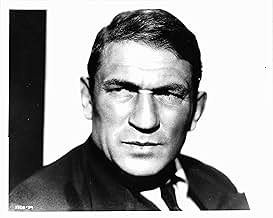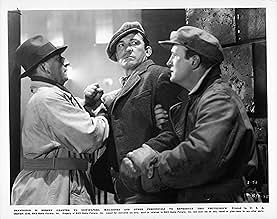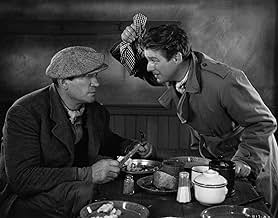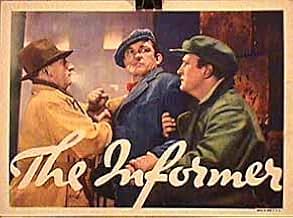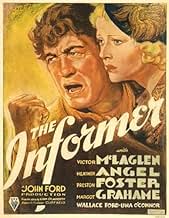CALIFICACIÓN DE IMDb
7.4/10
7.6 k
TU CALIFICACIÓN
En 1922, un rebelde irlandés delata a su amigo, pero finalmente se arrepiente.En 1922, un rebelde irlandés delata a su amigo, pero finalmente se arrepiente.En 1922, un rebelde irlandés delata a su amigo, pero finalmente se arrepiente.
- Dirección
- Guionistas
- Elenco
- Ganó 4 premios Óscar
- 13 premios ganados y 4 nominaciones en total
Joe Sawyer
- Barty Mulholland
- (as Joseph Sauers)
Steve Pendleton
- Dennis Daly
- (as Gaylord Pendleton)
Denis O'Dea
- Street Singer
- (as Dennis O'Dea)
Frank Baker
- Small Role
- (sin créditos)
- Dirección
- Guionistas
- Todo el elenco y el equipo
- Producción, taquilla y más en IMDbPro
Opiniones destacadas
Victor McLaglen, the title character of John Ford's THE INFORMER, reminded me of the circus man from Fellini's LA STRADA. Anthony Quinn played the brutish man, who may have even been influenced by the pug-faced, Oscar-winning performance given by McLaglen. Poverty-stricken Dublin is the true-life, atmospheric setting of the picture, which takes place in 1922. Dense fog and a long damp night are the main elements of a story about deep Irish patriotism and the fight of the Irish Republican Army. The conflict of individuality and the cause is what makes THE INFORMER tick. McLaglen's large, simple character just wants to go to America and we're reminded by signs of the price for a ticket frequently. Two different signs become the psychological centerpiece for the drunken Irishman. One is the previous, the other a WANTED sign. Should he do it and get the money to go?
John Ford once famously said, "My name is Ford. I make Westerns." After seeing this film, he obviously could do a heck of a lot more. The serious social issues dealt with here are heartfelt and ones you will find yourself thinking about. And the look of the piece is amazing, consisting of long dark shadows cutting into a miserable Ireland night. Ford was always known for his luminescent, gorgeous cinematography that helped to foresee the conflicts within his characters. This is hard in color, but he did it in pictures like THE SEARCHERS, painting John Wayne in a sometimes vicious manner. Victor McLaglen's performance not only benefits from the lighting, but by the sheer simplicity of his acting. He shoves a lot. He knocks people out. He is a brute who knows no better. He should, however, know whether or not to cross the IRA.
See the film to find out the gritty details. See it also for McLaglen and Ford's patriotic portrayal of the IRA. Max Steiner's score is innovative in how it matches gestures of the characters, placing more emphasis on them. This was usually only seen in silent films, especially Chaplin. The topic of naming names or "informing" is obviously still important. Just look at how the media covered this year's Oscars, giving much attention to the Elia Kazan scandal.
John Ford once famously said, "My name is Ford. I make Westerns." After seeing this film, he obviously could do a heck of a lot more. The serious social issues dealt with here are heartfelt and ones you will find yourself thinking about. And the look of the piece is amazing, consisting of long dark shadows cutting into a miserable Ireland night. Ford was always known for his luminescent, gorgeous cinematography that helped to foresee the conflicts within his characters. This is hard in color, but he did it in pictures like THE SEARCHERS, painting John Wayne in a sometimes vicious manner. Victor McLaglen's performance not only benefits from the lighting, but by the sheer simplicity of his acting. He shoves a lot. He knocks people out. He is a brute who knows no better. He should, however, know whether or not to cross the IRA.
See the film to find out the gritty details. See it also for McLaglen and Ford's patriotic portrayal of the IRA. Max Steiner's score is innovative in how it matches gestures of the characters, placing more emphasis on them. This was usually only seen in silent films, especially Chaplin. The topic of naming names or "informing" is obviously still important. Just look at how the media covered this year's Oscars, giving much attention to the Elia Kazan scandal.
One of John Ford's best films 'The Informer' doesn't feature any grand scenery of the American West. Instead the intense drama Ford was known for plays out on the no less rugged terrain of British character actor Victor McLaglen's face. The former prizefighter, who once faced Joe Louis in the ring, delivers an Academy Award-winning portrayal of disgraced IRA soldier Gypo Nolan on the worst night of his life.
The plot is gracefully simple: In 1922 Dublin, a starving and humiliated man who's been thrown out of the IRA for being unable to kill an informant in cold blood, himself becomes an informant. For £20 he betrays a friend to "the Tans" and for the rest of the night he drinks and gives away his blood money in rapidly alternating spasms of guilt, denial, self-pity, and a desperate desire to escape the consequences of his actions.
It is the remarkable complexity given to the character of the seemingly simple Gypo that is the film's most impressive achievement. In most movies a burly lout of Gypo's type would be cast as the heavy, he'd have at best two or three lines and be disposed of quickly so the hero and the villain could have their showdown. In 'The Informer' Gypo himself is both hero and villain, while the showdown is in his inner turmoil, every bit of which is explicitly shared with the audience.
Because Liam O'Flaherty's novel had previously been filmed in 1929, RKO gave Ford a very modest budget. The director and his associates, particularly cinematographer Joseph H. August, turned this to their advantage in creating a claustrophobic masterpiece about a man at war with himself. In addition to McLaglen's Oscar 'The Informer' also won John Ford his first along with wins for Best Screenplay and Best Score.
The plot is gracefully simple: In 1922 Dublin, a starving and humiliated man who's been thrown out of the IRA for being unable to kill an informant in cold blood, himself becomes an informant. For £20 he betrays a friend to "the Tans" and for the rest of the night he drinks and gives away his blood money in rapidly alternating spasms of guilt, denial, self-pity, and a desperate desire to escape the consequences of his actions.
It is the remarkable complexity given to the character of the seemingly simple Gypo that is the film's most impressive achievement. In most movies a burly lout of Gypo's type would be cast as the heavy, he'd have at best two or three lines and be disposed of quickly so the hero and the villain could have their showdown. In 'The Informer' Gypo himself is both hero and villain, while the showdown is in his inner turmoil, every bit of which is explicitly shared with the audience.
Because Liam O'Flaherty's novel had previously been filmed in 1929, RKO gave Ford a very modest budget. The director and his associates, particularly cinematographer Joseph H. August, turned this to their advantage in creating a claustrophobic masterpiece about a man at war with himself. In addition to McLaglen's Oscar 'The Informer' also won John Ford his first along with wins for Best Screenplay and Best Score.
I don't doubt that Victor McLaglen won his Best Actor Oscar for this film by dint of a three way split among the Mutiny on the Bounty leads of Clark Gable, Charles Laughton, and Franchot Tone who were all in the same race. But The Informer is still a fine film because John Ford wouldn't have gotten his first Best Director Oscar if it wasn't. No split involved in his award.
The movie and the story by Liam O'Flaherty that it is based on involves a poor simpleton of a man named Gypo Nolan who was once a member of the Irish Republican Army. He was cashiered out of it for some imbecilic stunt he pulled and wants back in. He's down to his last pence and if he can't get back in, wants enough for passage to America. There's a twenty pound reward for information leading to the arrest of a former comrade named Frankie McPhillip played by Wallace Ford. In a moment of weakness he goes to the Black and Tan constabulary and informs on McPhillip.
The IRA is pretty anxious to find out who ratted McPhillip out and they're pretty certain it was McLaglen. He hasn't the wit to really cover his own tracks. He does make a feeble effort to implicate another man named Peter Mulligan played by Donald Meek. He also picks up a hanger-on played by J.M. Kerrigan.
The whole action of The Informer takes place in 1922 in Dublin from about six in the evening to early the following morning. Of a necessity it is shot in darkness and shadows, making it possibly the first noir thriller. Had it been done post World War II The Informer would have ranked as a great noir classic, like Odd Man Out or the The Third Man which it bares a lot of resemblance to.
John Ford knew this world very well. He took some time off during the Rebellion and was in Ireland at the time and had a brother who was in the IRA. His real name before having it anglicized was Sean O'Fiernan.
Preston Foster plays the IRA commandant Dan Gallagher. In the book Gallagher is a harder and meaner man than Foster has him here. My guess is that John Ford wanted him as a sympathetic character to give movie fans some rooting interest. He makes it clear that Foster has to eliminate the informer because the Black and Tans will grab him and get quite a bit more out of him and put the whole organization in peril.
The IRA trial scene is the highlight of the film. When Foster asks Donald Meek whether he recognizes the authority of their court, Meek ain't in a position to say no. The King's justice and writ does not run here. It graphically illustrates at that point despite occupation by army troops and constabulary, the British are indeed losing their grip on the population.
Of course The Informer a rather grim story has its John Ford touches, but rather fewer than you would expect. Even as McLaglen is spending his money on a drunken spree, the IRA is constantly in the shadows watching him and counting every farthing.
The Informer is a tale well told about Ireland in a grim and dismal time.
The movie and the story by Liam O'Flaherty that it is based on involves a poor simpleton of a man named Gypo Nolan who was once a member of the Irish Republican Army. He was cashiered out of it for some imbecilic stunt he pulled and wants back in. He's down to his last pence and if he can't get back in, wants enough for passage to America. There's a twenty pound reward for information leading to the arrest of a former comrade named Frankie McPhillip played by Wallace Ford. In a moment of weakness he goes to the Black and Tan constabulary and informs on McPhillip.
The IRA is pretty anxious to find out who ratted McPhillip out and they're pretty certain it was McLaglen. He hasn't the wit to really cover his own tracks. He does make a feeble effort to implicate another man named Peter Mulligan played by Donald Meek. He also picks up a hanger-on played by J.M. Kerrigan.
The whole action of The Informer takes place in 1922 in Dublin from about six in the evening to early the following morning. Of a necessity it is shot in darkness and shadows, making it possibly the first noir thriller. Had it been done post World War II The Informer would have ranked as a great noir classic, like Odd Man Out or the The Third Man which it bares a lot of resemblance to.
John Ford knew this world very well. He took some time off during the Rebellion and was in Ireland at the time and had a brother who was in the IRA. His real name before having it anglicized was Sean O'Fiernan.
Preston Foster plays the IRA commandant Dan Gallagher. In the book Gallagher is a harder and meaner man than Foster has him here. My guess is that John Ford wanted him as a sympathetic character to give movie fans some rooting interest. He makes it clear that Foster has to eliminate the informer because the Black and Tans will grab him and get quite a bit more out of him and put the whole organization in peril.
The IRA trial scene is the highlight of the film. When Foster asks Donald Meek whether he recognizes the authority of their court, Meek ain't in a position to say no. The King's justice and writ does not run here. It graphically illustrates at that point despite occupation by army troops and constabulary, the British are indeed losing their grip on the population.
Of course The Informer a rather grim story has its John Ford touches, but rather fewer than you would expect. Even as McLaglen is spending his money on a drunken spree, the IRA is constantly in the shadows watching him and counting every farthing.
The Informer is a tale well told about Ireland in a grim and dismal time.
An excellent movie of the issue of being an informant and the consequences of the deed. Victor McLagen gives a sympatheic performance as Gypo Nolan, a man who's only way to Move to America is to tell on his best friend. This was one of the first movies that looks into the lives and organization of the IRA(Irish Republic Army). The Informer(1935) is good at showing the poverty stricken Northern Ireland of the 1920's.
Although John Ford has been making films since the early teens, it is this movie that put his name on the map. The Informer(1935) along with The Searchers(1956) are John Ford's most Catholic driven motion pictures as it deals with guilt and redemption. John Ford was good at showing the lifestyles and values of many Irishmen in many of his work. I Only wish that this movie was available on Home Video as it is hard to find.
Although John Ford has been making films since the early teens, it is this movie that put his name on the map. The Informer(1935) along with The Searchers(1956) are John Ford's most Catholic driven motion pictures as it deals with guilt and redemption. John Ford was good at showing the lifestyles and values of many Irishmen in many of his work. I Only wish that this movie was available on Home Video as it is hard to find.
Dublin, 1922 . Gypo Nolan (Victor McLagen) , a slow-witted Irish pug has been ousted from the rebel organization . He is hungry and attempts to impress his ladylove . When he finds that his equally destitute girlfriend Katie Madden (Margot Grahame) has been reduced to prostitution , he succumbs to temptation and turns his friend Frankie McPhillip (Wallace Ford) in for money to the British authorities for a 20 pound reward . Nolan then feels doom closing in . He also gets his comeuppance from the IRA (whose leader is Preston Foster) . Later on , Gypo gets home Mrs. McPhillip (Una O'Connor) and Mary McPhillip (Heather Angel) .
Intense film about loneliness , suspicion , frightening , treason , information ; and including a descriptive, evocative black-and-white cinematography . This is a dramatic film dealing with thought-provoking themes about betrayal , guilt and retribution . John Ford re-made "The Informer" (1929) by Arthur Robinson ; and , obviously, he was influenced by this version . Good acting by Victor Mclagen as a strong but none too bright man who betrays his former comrade , though overacting and bears excessive gesticulation . The day before shooting McLagen's trial scene , he proceeded to go out drinking - which Ford knew he would do - and the next day was forced to film the scene with a terrible hangover, which was just the effect Ford wanted . John Ford had been highly impressed by F.W. Murnau's ¨Sunrise¨ and wanted to bring an element of German Expressionism to this film . As it displays an expressionist cinematography by Joseph M August , plenty if lights and dark , being well showed in the course of one gloomy , foggy night . Interesting screenplay by Dudley Nichols who wrote the script in six days , being based from the story by Liam O'Flaherty .
This was the first of RKO's three-picture deal with director John Ford and despite its deserved reputation and multiple Oscars, it was a low budget production . Another reason why RKO was reluctant to make the film was because a version of the story had already been filmed in the UK in 1929 .Initially a box office failure, the film made millions when it was re-released after its multiple wins at the Academy Awards .Shot in 17 days and its production costs came to a mere $243,000 . The picture belongs the Ford's second period -subsequently his silent time-when John Ford (1895-1973) made a rich variety of stories and his reputation rightly rests on his work in the 30s and 1940s, as ¨Grapes of wrath¨ , ¨How green was my valley¨ , ¨Fugitive¨ , ¨They were expendable¨, ¨My darling Clementine¨ and the Cavalry trilogy
Intense film about loneliness , suspicion , frightening , treason , information ; and including a descriptive, evocative black-and-white cinematography . This is a dramatic film dealing with thought-provoking themes about betrayal , guilt and retribution . John Ford re-made "The Informer" (1929) by Arthur Robinson ; and , obviously, he was influenced by this version . Good acting by Victor Mclagen as a strong but none too bright man who betrays his former comrade , though overacting and bears excessive gesticulation . The day before shooting McLagen's trial scene , he proceeded to go out drinking - which Ford knew he would do - and the next day was forced to film the scene with a terrible hangover, which was just the effect Ford wanted . John Ford had been highly impressed by F.W. Murnau's ¨Sunrise¨ and wanted to bring an element of German Expressionism to this film . As it displays an expressionist cinematography by Joseph M August , plenty if lights and dark , being well showed in the course of one gloomy , foggy night . Interesting screenplay by Dudley Nichols who wrote the script in six days , being based from the story by Liam O'Flaherty .
This was the first of RKO's three-picture deal with director John Ford and despite its deserved reputation and multiple Oscars, it was a low budget production . Another reason why RKO was reluctant to make the film was because a version of the story had already been filmed in the UK in 1929 .Initially a box office failure, the film made millions when it was re-released after its multiple wins at the Academy Awards .Shot in 17 days and its production costs came to a mere $243,000 . The picture belongs the Ford's second period -subsequently his silent time-when John Ford (1895-1973) made a rich variety of stories and his reputation rightly rests on his work in the 30s and 1940s, as ¨Grapes of wrath¨ , ¨How green was my valley¨ , ¨Fugitive¨ , ¨They were expendable¨, ¨My darling Clementine¨ and the Cavalry trilogy
¿Sabías que…?
- TriviaJohn Ford kept Victor McLaglen continually off-balance (and thus in character) by getting him drunk, changing his schedules, verbally abusing him on and off the set and filming scenes when he'd told McLaglen that they were only rehearsing. For the crucial rebel court scene, the story goes that Ford reduced the actor to a trembling wreck by promising him the day off only to bring him into the studio early and extremely hung over, insisting that he spit out his lines. McLaglen was so furious with Ford over this that he threatened to quit acting and kill the director.
- ErroresFrankie McPhillip tells his mother he travelled to her house via O'Connell Street. In 1922, the year the movie is set, O'Connell Street was still offically called Sackville Street, but the Irish Home Rule Party had unsuccessfully attempted to change it to "O'Connell Street" prior to this and this name was commonly used by nationalist Dubliners.
- Citas
Gypo Nolan: And now the British think I'm with the Irish, and the Irish think I'm with the British. The long and short of it is I'm walkin' around without a dog to lick my trousers!
- Créditos curiososOpening credits prologue: 1920 "Then Judas repented himself-and cast down the thirty pieces of silver - and departed."
- Versiones alternativasSince its original release, the UK prints of this film have omitted all references to the IRA, but a 1998 release on a budget video label restored these cuts.
- ConexionesFeatured in Directed by John Ford (1971)
Selecciones populares
Inicia sesión para calificar y agrega a la lista de videos para obtener recomendaciones personalizadas
- How long is The Informer?Con tecnología de Alexa
Detalles
- Fecha de lanzamiento
- País de origen
- Idioma
- También se conoce como
- The Informer
- Locaciones de filmación
- Productora
- Ver más créditos de la compañía en IMDbPro
Taquilla
- Presupuesto
- USD 243,000 (estimado)
- Tiempo de ejecución1 hora 31 minutos
- Color
- Relación de aspecto
- 1.37 : 1
Contribuir a esta página
Sugiere una edición o agrega el contenido que falta

Principales brechas de datos
By what name was Delator (1935) officially released in India in English?
Responda

